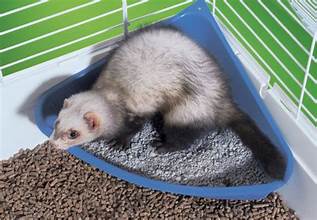Ferrets have captured hearts with their playful antics and undeniably cute looks. But before you rush out and adopt one of these charming creatures, it’s important to understand their needs and quirks. This post will delve into ferret essentials, helping you decide if a ferret fits your lifestyle.
Those playful, noodle-shaped creatures with endlessly curious noses have captured the hearts of many. But before you dive headfirst into ferret ownership, there’s some crucial information you need to consider. While undeniably cute, these little guys aren’t your typical cuddly companions.
Ferret Facts: A Glimpse into Their World
Mustelid Madness:
Contrary to popular belief, ferrets are not rodents! They belong to the same family as weasels, wolverines, and badgers. They share a playful and inquisitive nature, often nicknamed “living slinkies” for their love of burrowing and exploring tight spaces.
Social Butterflies:
Ferrets are highly social creatures and thrive in companionship. Consider adopting two ferrets to keep each other company.

Full of Energy:
Ferrets are playful and require plenty of exercise outside their cages. They are like cats on steroids, with a penchant for burrowing and squeezing into tight spaces.

The Mighty Hunters:
Their wild instincts remain strong. Ferrets love to burrow, dig, and explore every nook and cranny. Be prepared to ferret-proof your home!
Dietary Delights:
Ferrets are obligate carnivores, meaning their diet must consist solely of meat. High-quality ferret kibble is ideal, supplemented with occasional meat treats.
The Silent Scream:
Ferret’s communication is unique and fascinating. They don’t meow like cats, but they do dook (a happy warbling sound), chatter (when excited), and even hiss (when scared). Understanding their language can be a rewarding part of ferret ownership.
A Rich History:
Domesticated for over 2,000 years, ferrets have a rich and fascinating history. They were once used for hunting rabbits and rodents, a testament to their intelligence and adaptability.
Considering a Ferret? Here’s What You Need to Know
Ferrets are escape artists and natural chewers. Here’s how to prep your home for their arrival:
Commitment Counts:
Ferrets can live for 6-10 years. Owning one is a long-term responsibility.
Space Cadets:
Ferrets need plenty of room to roam and play. Consider creating a ferret-safe playpen or ferret-proofing a room in your home.
Escape Artists:
Ferrets are notorious Houdinis. Ensuring your home is escape-proof with secure cages and blocked holes is crucial to responsible ferret ownership. Closely supervising them during playtime is also a must.
Chew Crew:
Like toddlers, ferrets explore the world with their mouths. Provide plenty of safe chew toys to stop them from getting into trouble.
Litter Box Training:
The good news? Ferrets can be litter box trained! Provide a shallow litter box with ferret-specific litter, which is dust-free and safe for their sensitive respiratory systems. Be patient, as litter box training can take some time. Also, when bathing your ferret, use a ferret-specific shampoo that is gentle on their skin and won’t strip their natural oils.
Cleanliness Counts:
Daily litter box cleaning is essential. Ferrets are relatively clean animals, but their strong scent can linger if their cage isn’t correctly maintained.

The Vet Life:
Regular vet checkups are crucial for maintaining your ferret’s health. Some areas may also have restrictions on ferret ownership, so research local laws before adopting.
Blockade the Burglars:
Ferrets can squeeze through surprisingly small openings. Ensure your home is escape-proof by sealing gaps, covering vents with wire mesh, and securing crawl spaces.
Hide the Hazards:
Electrical cords, toxic plants, and small objects are dangerous to ferrets. Ferret-proof your home by removing these hazards and using bitter apple spray to deter chewing.
Create a Safe Haven:
Provide your ferret with a spacious cage with hiding spots, a litter box, comfortable bedding, and hammocks.

Keeping Clean:
Ferrets bathe themselves regularly, but occasional baths with a ferret-specific shampoo might be necessary. Ask your vet about proper bathing techniques.
Ferret pros:
They’re playful, entertaining, and cuddle (sometimes) when they’re sleepy.
Ferret cons:
They require a significant commitment of time, space, and money. Their pungent odor and playful chewing habits might only be for some. Owning a ferret includes initial setup (cage, bedding, toys), ongoing expenses (food, litter, vet visits), and potential emergency medical costs.
The Ferret’s Final Verdict
Ferrets are lovely companions, but they require a significant commitment. Consider your lifestyle and living situation. If you can provide a ferret-proofed home, ample playtime, and lots of love, then a ferret might be your perfect match! But remember, this commitment is not to be taken lightly.
Ready to Learn More?
If you’re serious about adopting a ferret, do your research! The American Ferret Association [American Ferret Association ferret.org] offers information on ferret care, health, and adoption. Remember, a happy ferret is a well-informed ferret owner!




